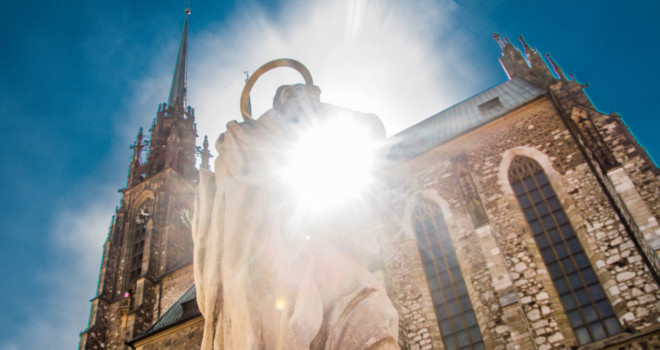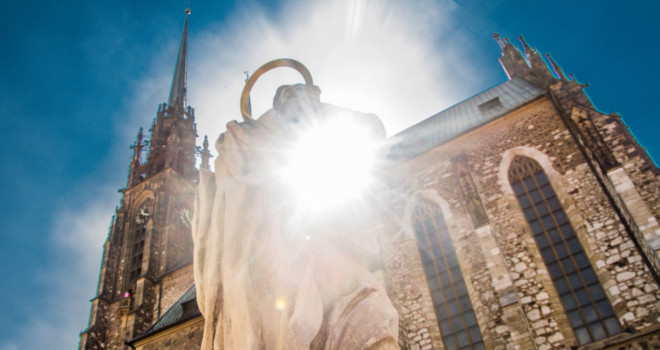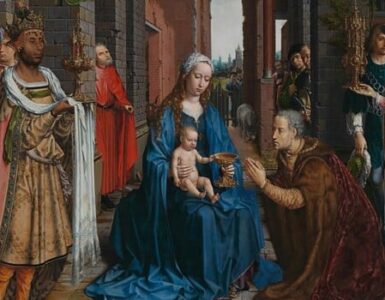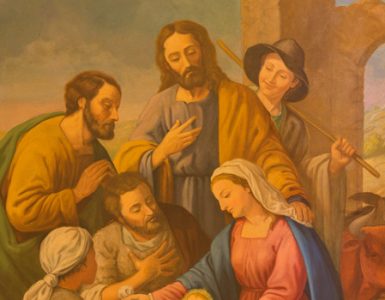Our culture has a very confused sense of heroism, often applauding the biggest, strongest, loudest, or wealthiest. Blockbuster movies and an endless parade of celebrities and sports figures dominate the mainstream representation of heroes. But true heroism — the kind that saves lives, preserves dignity, and protects the most vulnerable — is a determined, steadfast power, under control and directed toward the good with the clarity of purpose that comes with humility. A hero isn’t someone born with unconquerable strength and selflessness. Heroes are not formed in a cataclysmic instant. Heroism is developed over time, one decision after another, moment by moment, formed by a deliberate, chosen, and habitual response to life.
A hero is cultivated by countless — often unnoticed — actions. Heroes are not made by a spider’s bite or on an alien planet. They are ordinary humans — you and me — who direct their decisions and actions to be strengthened by goodness, compassion, integrity, and righteousness. They are the ones who are willing to venture out of the safe harbor of what is comfortable and venture into the wild, untamable sea of God’s calling. In other words, the hero’s journey is one of deep virtue.
“A hero is just a common person, like you and me, choosing to do an uncommon thing.”
There are two types of virtues proposed by the Catholic Church: the cardinal virtues and the theological virtues. The cardinal virtues — also called the moral, human, or natural virtues — are justice, temperance, prudence, and fortitude. The three theological virtues — also called the spiritual or Godward virtues — as described by St. Paul, are faith, hope, and love.
Each virtue plays an important role in our relationship with God and others, and each calls us deeper into the wave of God’s unexpected adventure for our lives. By choosing to live virtuously, by intentionally seeking to develop the seven virtues in our lives and hearts, we are choosing to immerse ourselves in God’s will. In this book, I will explore the seven virtues and demonstrate how they equip all of us to walk in the way of the hero and enable us to venture more deeply into the dynamic love of God.
Around the year 500 BC, the Greek philosopher Socrates declared that the habitual practice of the four moral virtues of justice, prudence, temperance, and fortitude was the only path to happiness. His teaching contradicted the Greek belief and practice of appeasing the melodramatic pantheon of gods. To the contrary, he reasoned that there could be only one true God. He believed that “no evil can befall a good man.” Evil can assault a man in many ways, but it can never harm the soul of a good man since he would only grow in virtue as a result. On the other hand, the evil man does harm to his own soul. Socrates held fast to his convictions and paid the ultimate price when he willingly died for embracing these virtues and for refusing to deny his reasoned belief in there being only one God. The ruling powers, irritated by his politics, philosophy, and religious beliefs, sentenced him to execution by drinking poison. Socrates walked the way of heroic virtue.
The book of Wisdom says, “And if any one loves righteousness, her labors are virtues; for she teaches self-control and prudence, justice and courage; nothing in life is more profitable for men than these” (8:7). Socrates believed that if people truly understood that living the virtuous life was the key to happiness, then everyone would naturally live perfectly virtuous lives. But St. Paul had a different view on humanity’s ability and willingness to do so. He knew that the human soul is wounded and has an inclination toward evil. He understood that we inherited a fallen nature.
St. Paul groaned in Romans 7:15, “I do not understand my own actions. For I do not do what I want, but I do the very thing I hate.” He knew that man’s will to pursue the moral virtues is weakened by Original Sin. Our fallen nature resists our pursuit of virtue. As Paul continues, “So then, brethren, we are debtors, not to the flesh, to live according to the flesh — for if you live according to the flesh you will die, but if by the Spirit you put to death the deeds of the body you will live. For all who are led by the Spirit of God are sons of God” (Romans 8:12–14).
I spend a lot of time in Cocoa Beach, Florida, and I often get to watch rocket launches. In these verses from Romans, Paul is saying that we cannot pull ourselves out of the deteriorating orbit of sin without a rocket engine — that is, the power of grace. Through the writings of St. Paul, God gives us the rocket ship we so desperately need. The theological virtues of faith and hope are the booster rockets — love is the primary rocket.
Paul was no pseudo-spiritualist wimp or soft philosopher. His beliefs compelled him to venture forth into distant lands and hostile environments on his mission to spread the good news and rescue a dying world. He was like a real-life Rocky Balboa. Every time he was knocked down, he got back up and kept fighting. He was beaten with rods three times, pelted with stones and left for dead once, and shipwrecked three times (2 Corinthians 11:25). Yet he spoke boldly of his faith and showed those around him the love of Christ. I have been in St. Paul’s last prison cell outside of Rome, along the Appian Way. I have the seen the stone pillar where he placed his neck just before the executioner’s sword swung down in a powerful, deadly arch. Whether in prison or free, hungry or feasting, alone or in a crowd, he fought the good fight; he finished the race (1 Timothy 6:12; 2 Timothy 4:7). Paul walked the way of heroic virtue.
Like the indomitable cowboys of the old western films riding into town to save the day, these are the true magnificent seven virtues. For each hero, there is a point of departure from the norm. This is where the true adventure begins. A hero is just a common person, like you and me, choosing to do an uncommon thing. Virtue challenges us to lay down our lives in service to God’s perfect will. Long before believers were called Christians, their beliefs were referred to as The Way. It is the legacy of the believers who have gone before us that challenges us to venture out and walk The Way of heroic virtue.
✠
Editor’s note: This article is adapted from a chapter in Bear Woznick’s latest book, Deep Adventure: The Way of Heroic Virtue. You can order it through your local Catholic bookstore or online through Sophia Institute Press.













